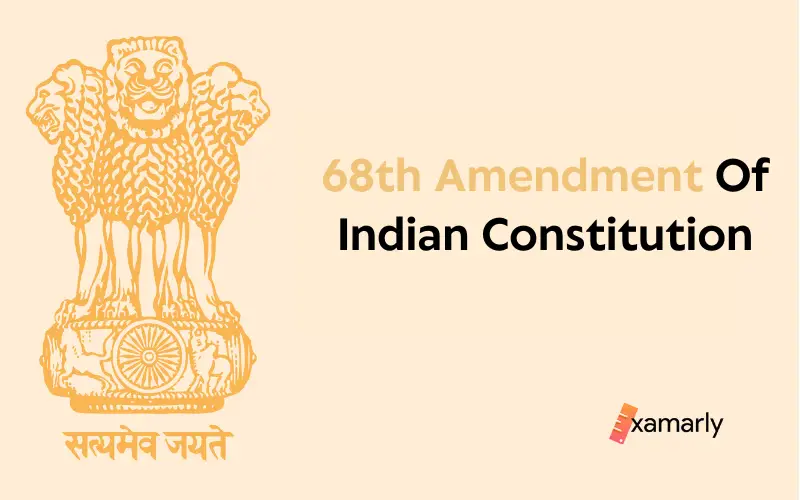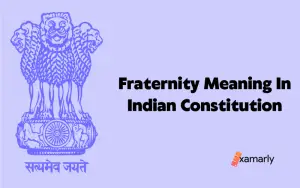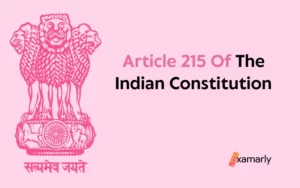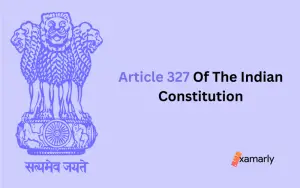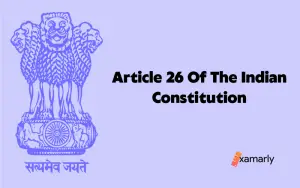Free and fair elections in Punjab appeared unattainable while security forces were applying pressure. Violence and terrorist attacks continued in Punjab despite all efforts. Because of this, it seems unlikely that the elections for Punjab’s Legislative Assembly would be free and fair.
As a result, Article 356’s clause (4) was altered so that the aforementioned proclamation might be extended to the State of Punjab for a maximum of five years. This is known as the 68th amendment of Indian constitution
Background
- Introduced on March 12, 1991, it is known as the “Sixty-Eighth Amendment Act, 1991”.
- As per the decree which was issued on May 11, 1987, the three-year time limit in the State of Punjab was increased to three years and six months. This is in accordance with the Sixty-fourth Amendment Act of 1990.
- In October 1990 when it was assumed that fair and peaceful elections couldn’t be held in the Punjab State Legislative Assembly, then the President’s decree issued on May 11, 1987, extended for a total of four years according to an amendment made by The Sixty-seventh Amendment Act, 1990 to Article 356, clause (4).
- Terrorist activity persisted in Punjab despite the efforts of security forces. The situation did not suggest that fair elections to the Legislative Assembly of Punjab are can be possibly attained.
- Due to all such problems, finally, the “Sixty-Eighth Amendment Act, 1991” altered Clause (4) of Article 356 of the Constitution for the third time. It enabled the aforementioned Proclamation regarding the State of Punjab to be prolonged for a total of five years.
- This is the eighth and the most recent alteration to Article 356 of the Indian Constitution.
Salient Features And Facts
- As per the amendment, it is requested that clause (4) of the Indian Constitution’s article 356 should be changed and it should enable the extension of the aforementioned decree to Punjab for a maximum of five years
- In article 356 of the Indian Constitution within clause (4) and as mentioned in the third Proviso, “four years” shall be replaced with the words “five years”.
- This is the eighth and the most recent alteration to Article 356 of the Indian Constitution.
Read Also – 67th Amendment Of Indian Constitution
Date Enacted
The ‘Sixty-Eighth Amendment Act, 1991’ was ratified on March 12, 1991.
Statement Of Objects And Reasons
- No Decree issued under that article and authorized by both Houses of Parliament may be in effect for a length of more than three years, according to the Indian Constitution’s Article 356 and Clause (4).
- Nevertheless, under clause (5) of the aforementioned article, neither House of Parliament may approve the extension of a Declarations issued under clause (1) of that article further than a time frame of one year unless both of the conditions relating to a Presidential order being in effect in all or part of the State and the Election Commission’s certification that the extension of the Proclamation issued under clause (1) are fulfilled.
- Issued on 11th May 1987, the three-year period in the event of Proclamation with respect to Punjab was extended to three years and six months by the sixty-fourth amendment of the constitution of India. In order to make it possible to organize elections for the State’s Legislative Assembly, clause (5) of article 356 was also altered by that Act.
- In October 1990 when it was felt that it was nearly impossible to hold elections in a free and fair manner in the State Legislative Assembly of Punjab, then clause (4) of article 356 was again amended by the constitution (Sixty-seventh Amendment) Act, 1990 to enable the extension of President’s decree furnished on 11th May 1987 for a total period of 4 years.
- Although extreme pressure was being exerted by the security forces, the terrorist violence was uncontrollable in Punjab. Thus, it was held that the prevailing circumstances are not conducive for elections to be conducted peacefully in the State Legislative Assembly of Punjab.
- Thus, Clause(4) of the Indian Constitution’s Article 356 came out with the amendment called the 68th amendment of Indian Constitution to make the extension of the said Proclamation easy and smooth up to a total period of five years in relation to Punjab.
Important Provisions In 68th Amendment Of Indian Constitution
In the Indian Constitution’s article 356 within clause (4) and as mentioned in the third Proviso, “four years” shall be replaced with the words “five years”.
Summing Up
First introduced on March 12, 1991, and is known as the “Sixty-Eighth Amendment Act, 1991.” The decree that was released on May 11, 1987, increased the three-year time limit in the State of Punjab to three years and six months. This is accomplished in accordance with the Sixty-fourth Amendment Act of 1990. When it was believed in October 1990 that free and fair elections could not be held in the Punjab State Legislative Assembly, the President’s Proclamation issued on May 11, 1987, was extended for a total of four years in accordance with an amendment made by The Sixty-seventh Amendment Act of 1990 to Article 356, clause (4).
In Punjab, terrorist activities remained despite the security forces’ best efforts. Fair elections are not indicated by the current circumstances. Finally, as a result of all of these issues, Clause (4) of the Indian Constitution’s Article 356 was revamped for a third time by the “Sixty-Eighth Amendment Act, 1991.” It made it possible to extend the aforementioned proclamation pertaining to Punjab for a cumulative period of five years.
FAQ’s
Which is the most recent alteration to the Indian Constitution’s Article 356?
68th Amendment Act of 1991 is the most recent alteration to the Indian Constitution’s Article 356.
What does Article 356 of the Indian Constitution say?
According to Article 356, the Union government may directly take over the control of the state setup if a state government is unable to operate in accordance with constitutional requirements.


